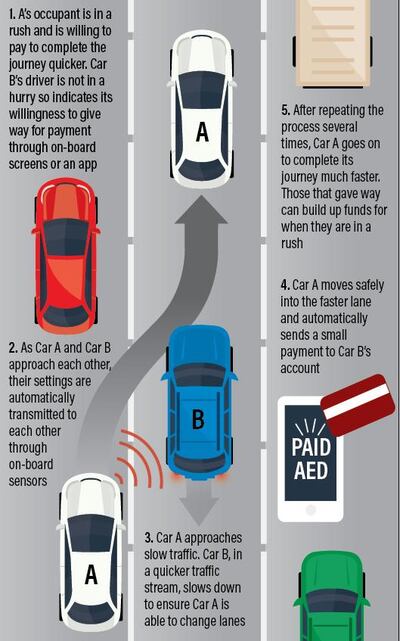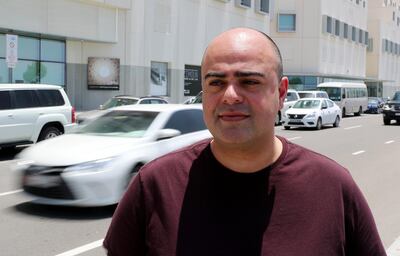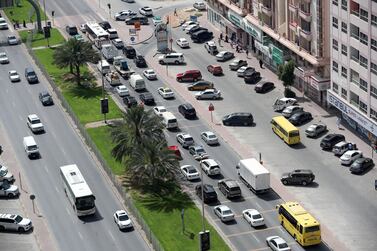In Dubai, it costs Dh4 to pass a Salik toll gate. In London, thousands pay Dh55 every day just to drive into the centre of the city.
But would motorists be willing to part with cash to simply change lane on a motorway?
The answer is yes, according to a UAE-based academic who believes a system of micro-payments – which would involve drivers in a hurry paying others to give way – could revolutionise the way cars interact after autonomous vehicles are rolled out.
These proposals would allow passengers to adjust settings, before their journey, to indicate whether they are willing to pay to arrive at their destination more quickly. The car would then communicate with others on the road, and those not in a rush would give way, earning a small payment, probably no more than the equivalent of a few US cents, which would be automatically transferred.
The system could create a “win-win” for motorists, said Saif Jabari, an assistant professor of civil and urban engineering at New York University Abu Dhabi and the co-author of a new paper that sets out how a micro-payment system between motorists could work.

“We don’t know whether people would trust their cars to make them money, or pay a little bit of money to get them ahead,” he said. “But I think it is plausible because it’s very similar to tolls.
“I used to live in New York City and, in rush hour, when people are trying to get to work, you pay a little bit every time you cross a bridge and some of the bridges can get very expensive, $10 or $15 [Dh36 - Dh55].
“You see people are very willing to do that just to gain a few minutes on their trip. So if you create this as an opportunity, you will have people willing to pay, and willing to be paid. It’s a hypothetical idea that’s in its infancy but we’re very excited about it.”
The system could eventually incorporate Uber-style ‘surge’ pricing, with drivers paying each other more for priority at busier times. It could even give drivers the option to negotiate directly with each other, making ‘bids’ to others which could be accepted, rejected or subject to a counter-offer. Although individual payments per lane change would be small – they could build up over time.
The system could be especially welcome in the UAE, Dr Jabari said, as a high number of international residents can make driving confusing because of different driving norms and signals – such as flashing headlights – which can mean different things to motorists depending on where they come from.
His modelling shows that the system, which would only work between self-driving cars, could lead to improved traffic flow for everyone even if only a small proportion of vehicles on the road, perhaps 10 to 20 per cent, took part.

If penetration was higher, and all cars were autonomous, it could be used to negotiate traffic at junctions, he said. A ‘VIP’ vehicle willing to pay significantly more could save up to around 35 per cent of time on a journey in moderate-to-heavy traffic, the modelling found. It would be unnecessary in free-flowing traffic conditions and would not work if congestion was bumper to bumper.
The system was partially inspired by Chinese PhD students who regularly use a WhatsApp-style service, WeChat, to make quick online payments to each other. Dr Jabari’s paper that explained the system, which is currently under review, has been gaining traction at conferences and will be published in a major journal this year.
There are issues with the proposals, such as how to stop people clogging up roads simply to earn money as well as questions over morality, which are still to be grappled with, Dr Jabari admitted.
But he insists the idea has potential and his paper calls for further research, including more work on what level payments should be set at.
Optimistic figures within the industry believe self-driving cars could be on the roads early in the 2020s.
“When there’s competition for space you have a winner and a loser,” he said. “If you’re a bully you might push yourself ahead, if you’re a little timid you might want to wait for a long gap.
"Our results show that lane changing with transferable utility between drivers can help achieve a win-win result.
“It can be very confusing to change lanes here. In a country like the UAE, it’s very hard to pinpoint what the driving culture is because people come here with their own cultures already. There might be a miscommunication where someone is letting you go but you don’t realise. In real traffic, lane changing is a major source of incidents, as well as junctions.
“By turning it into a negotiation, we anticipate that we would help eliminate those problems.”







